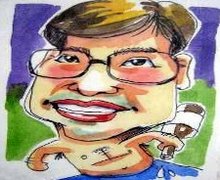Simple, little need, stay put through good time or bad time.
Can we match them?
Read this article from the The Star, Monday November 5, 2007
Young teacher gives stirring speech of how orang asli persevere
By SHAILA KOSHY
By SHAILA KOSHY
KUALA LUMPUR: At first glance, Tijah Yok Chopli strikes one as a petite and demure orang asli.
 Tijah: Believes that the
Tijah: Believes that the Federal Constitution
has fallen short of fulfilling
its purpose
But when she speaks, you are caught in a powerhouse of energy, honesty and passion.
The young teacher from Bidor was just one of more than 100 panellists at the recent 14th Malaysian Law Conference, but this non-lawyer brought home powerfully the importance of the Federal Constitution and of constitutionalism for marginalised peoples.
“I think the colonials thought of this place as Tanah Melayu because they went to the estuaries or the edges of the jungles where they met Malays only,” she said.
Speaking in Bahasa Malaysia on “Orang Asli and our Constitution – Protecting Indigenous' Customs and Cultural Rights”, Tijah showed that the Constitution had fallen short in fulfilling its purpose.
Tijah, who is a Senoi, confessed that when she was given the topic to talk on, she had no idea what the Constitution was apart from a vague memory of the reference in the Rukunegara to its supremacy.
However, she set herself the task of reading it and was surprised by what it contained.
Tijah said the orang asli may not know about the Constitution but they lived by their own constitution and laws.
Tijah said the orang asli may not know about the Constitution but they lived by their own constitution and laws.
“We have our own groups and districts and zones and make decisions by consensus. We build on the policy of sharing and living in harmony with each other and with nature.
“Our lives are stress-free, unlike urban life which is wreaked with rape here and there, kidnapping here and there, and house break-ins here and there.
“I can pull my collar up with pride,” she said, and did just that.
Unlike many who left Malaysia during the 1997 economic crisis, Tijah said the orang asli stayed put: “Whether the economy is good or bad, we are poor.”
“We are not anti-development. I too want money, to be rich, to have a car, to have development but not to the extent that we lose our customs and values,” she said.
Fellow panellist Centre for Orang Asli Concerns coordinator Dr Colin Nicholas said the orang asli were not just attached to a plot of land but a particular geographical space.
“It is the basis of their spirituality and the source of their identity. They want their land on their terms,” he said, adding that the orang asli had been clearly left out when the Constitution was drafted.
Universiti Malaya Faculty of Law deputy dean (research and development) Dr Ramy Bulan said the preservation of indigenous peoples languages was important.
“Without language, dances and ceremonies are debased to mere entertainment,” she said.




No comments:
Post a Comment